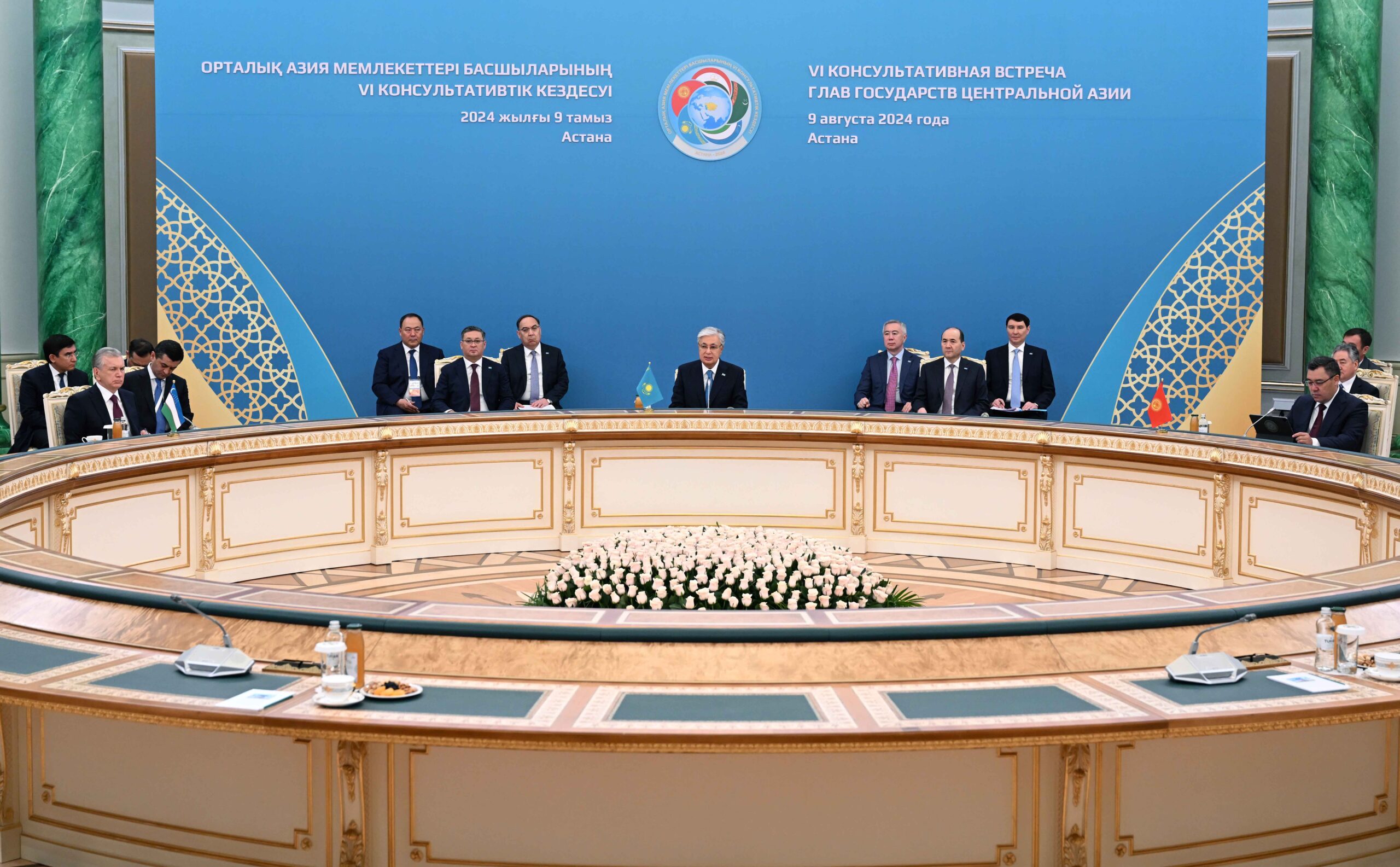ASTANA – President Kassym-Jomart Tokayev highlighted Kazakhstan’s strategic course for the comprehensive strengthening of regional partnership and increasing the role of Central Asia on the world stage аt the sixth consultative meeting of Central Asian heads of state on Aug. 9, reported Akorda.

Photo credit: Akorda
“At the national level, we firmly adhere to the formula ‘A successful Central Asia is a successful Kazakhstan.’ I am convinced that our region’s future depends solely on a trusting dialogue and cooperation between our countries, a joint search for adequate responses to all internal and external challenges,” he said.
Tokayev emphasized that the heads of state are making great efforts to develop regional cooperation, including in the format of consultative meetings. During Kazakhstan’s chairmanship, several joint events were held to bolster security, economic partnership, the role of women in society, and expert interaction.
Roadmap for cooperation and Central Asia 2040 Strategy
The President highlighted the upcoming approval of the Roadmap for regional cooperation until 2027 and the Central Asia 2040 strategy, which aims to improve intergovernmental coordination and develop regional collaboration mechanisms.
Given the current difficult geopolitical and economic realities, Tokayev noted with satisfaction the fruitful mutual visits made over the past year, which underscore the high level of regional cooperation based on friendship, good neighborliness, and alliance between the countries.
He called on the presidents to focus all efforts to ensure that Central Asia remains a space of security, cooperation, and prosperity. Tokayev named forming a solid economic base for multilateral cooperation another urgent task.
Emphasis on economic partnership and transit and transport potential
The President pointed out the region’s growing trade volume, which reached $11 billion, and the goal to increase it to $15 billion. He also emphasized the potential of large joint infrastructure projects such as the Kambarata Hydro Power Plant (HPP-1) in the Kyrgyz Republic and Rogun HPP in Tajikistan, as well as gas projects in Kazakhstan, Uzbekistan, and Turkmenistan.
Tokayev stated that Kazakhstan supports the proposal to establish the Business Council of Central Asian countries, noting the importance of further developing the region’s transit and transport potential and the adoption of the Comprehensive Strategy for the Development of the Central Asian Transport System.
Special emphasis is placed on projects such as the Trans-Caspian International Transport Route, the North-South Corridor, and the Belt and Road Initiative. Thanks to joint efforts, the potential of the Kazakhstan-Turkmenistan-Iran railway, which is the shortest route to the Persian Gulf countries, is consistently increasing.
“We consider the construction of the Trans-Afghan Railway, which opens access to the markets of South Asia, to be promising. Kazakhstan is carrying out large-scale internal work in the transport and transit sector. By 2030, our country plans to modernize 11,000 kilometers and build over 5,000 kilometers of new railways,” he noted.
Consolidated water policy and water-energy consortium
Tokayev also advocated for a new consolidated water policy, emphasizing equitable and fair water use, and proposed the development of a Water and Energy Consortium for Central Asian countries. Current tasks include digitizing water distribution and accounting, introducing space monitoring technologies, and developing systematic scientific work.
He called for expanding cooperation in education, culture, and human capital development, highlighting Kazakhstan’s partnerships with top universities and its invitation to Central Asian youth to study in the country.
Tokayev suggested enhancing cooperation in the information and analytical spheres, including creating joint media products and establishing a pan-regional TV channel or an Internet news portal.
Presidents Sadyr Japarov of the Kyrgyz Republic, Emomali Rahmon of Tajikistan, Serdar Berdimuhamedov of Turkmenistan, and Shavkat Mirziyoyev of Uzbekistan also delivered remarks at the meeting.
Following the consultative meeting of the heads of state of Central Asian countries, the presidents signed several important documents, including a joint statement by the Central Asian heads of state summarizing the meeting, the Central Asia – 2040 concept for the development of regional cooperation, and a decision by the consultative meeting to award the President of Uzbekistan, Shavkat Mirziyoyev, with an Honorary Badge from the Central Asian heads of state.
The joint statement also endorsed additional documents, such as a roadmap for the development of regional cooperation for the years 2025-2027 and an action plan for industrial cooperation among Central Asian states for 2025-2027.
Additionally, during the consultative meeting, members of the official delegations signed a memorandum of understanding on the development of transport and logistics centers in Central Asian states, a communiqué from the first meeting of Central Asian energy ministers, and the Astana communiqué from the second meeting of Central Asian transport ministers.
